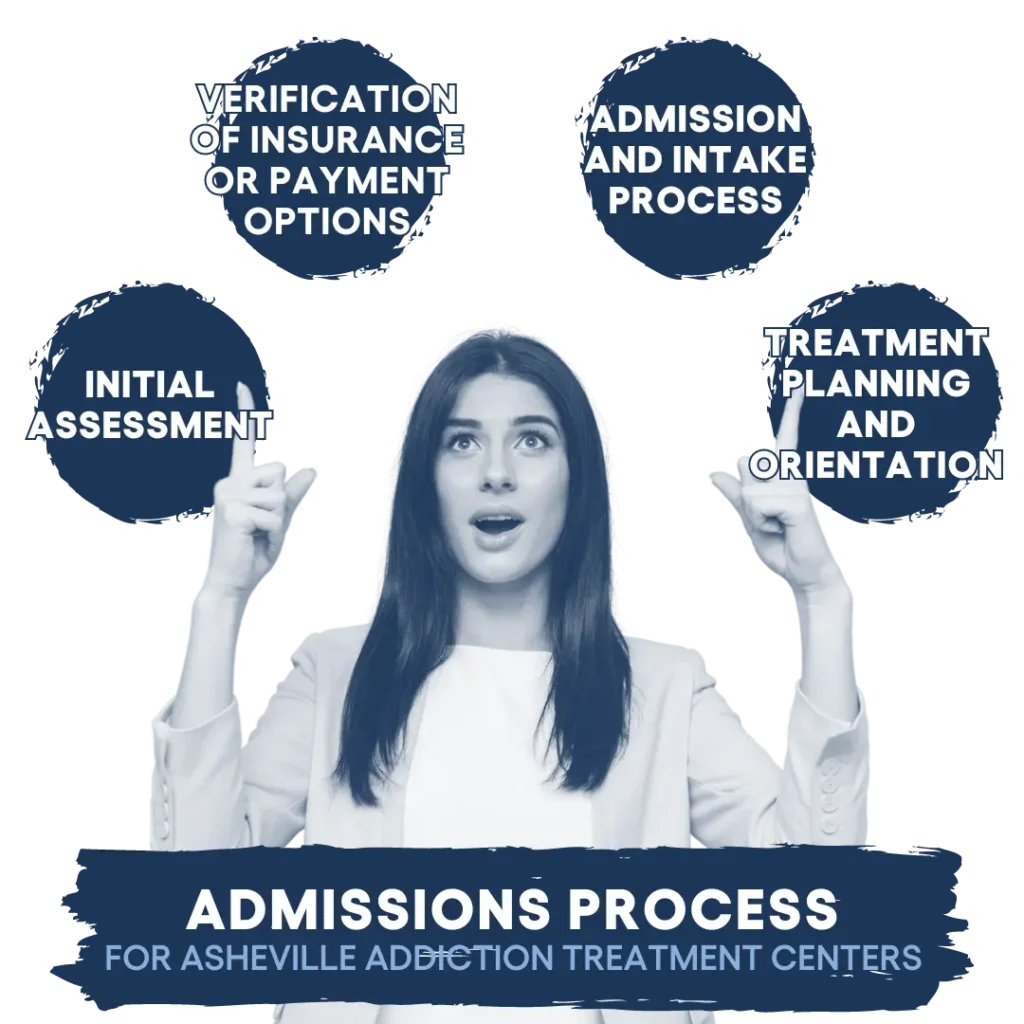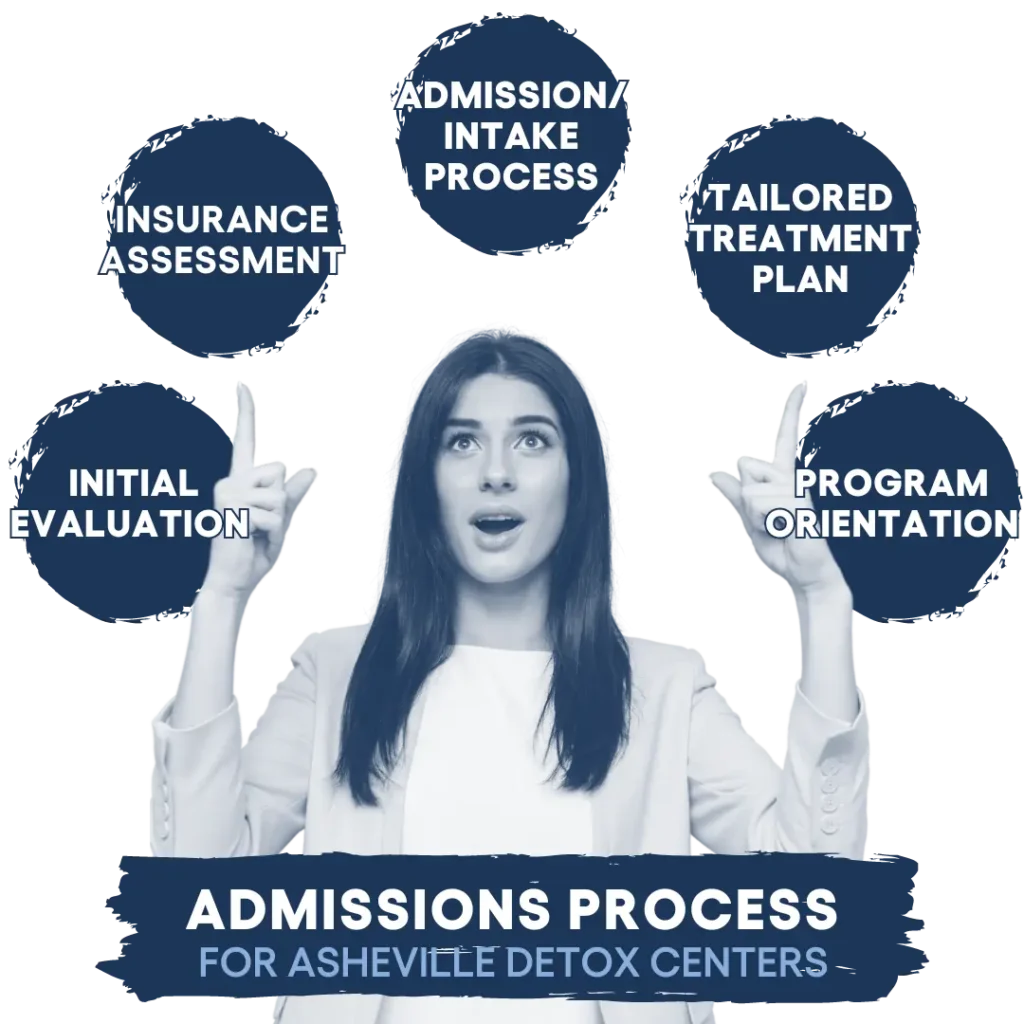If you are in the Asheville area and need help with drug and alcohol addiction – call (704) 248-8561.

Asheville, NC, is nestled in the heart of the Blue Ridge Mountains. It holds a unique charm that captivates visitors and residents alike. Home to a vibrant arts scene, eclectic music venues, and a thriving culinary culture, Asheville is a haven for creatives and food enthusiasts. Its stunning natural beauty, with nearby national parks and the scenic Blue Ridge Parkway, offers endless opportunities for outdoor adventures, from hiking and biking to river rafting.
Even among the beauty, Asheville residents face struggles with drug and alcohol addiction and mental health disorders. There are many treatment options available in the area – treating addictions and disorders spanning several diagnoses and ranging in type and severity. Common diagnoses include depression, anxiety, PTSD, bipolar, and drug and alcohol addiction.
In Asheville, many addiction treatment options await those seeking support for substance abuse and mental health challenges. Finding the ideal program involves assessing personal needs, preferences, and the desired level of support. Consulting with medical experts or addiction specialists is crucial in navigating the selection process, ensuring individuals find the most suitable facility and treatment regimen to address their specific circumstances effectively.
These treatment options may include:
Inpatient Rehabilitation Programs: Residential treatment facilities provide round-the-clock care and support, offering structured therapy sessions, medical supervision, and a supportive environment for individuals to focus solely on recovery.
Outpatient Treatment: Outpatient programs offer flexibility for those with commitments such as work or family, providing counseling, therapy, and support group sessions while allowing participants to continue living at home.
Detoxification Services: Medical detox programs assist individuals in safely managing withdrawal symptoms while removing toxins from their bodies, often as the initial step in the treatment process.
Dual Diagnosis Treatment: Specialized programs cater to individuals struggling with both addiction and co-occurring mental health disorders, offering integrated treatment to address both conditions simultaneously.
Individual Counseling: One-on-one therapy sessions with trained counselors or therapists provide personalized support, helping individuals explore underlying issues contributing to addiction and develop coping strategies.
Group Therapy: Group sessions foster a sense of community and support among individuals in recovery, offering opportunities to share experiences, gain insight, and receive encouragement from peers facing similar challenges.
Holistic Therapies: Alternative therapies such as yoga, meditation, art therapy, and mindfulness practices complement traditional treatment approaches, promoting overall well-being and addressing the mind, body, and spirit.
Family Therapy: Family-focused therapy sessions involve loved ones in the recovery process, addressing family dynamics, communication patterns, and providing education and support to help heal relationships affected by addiction.
When trying to find the right drug treatment center in Asheville, NC, it is important to consider a few things to ensure that you or your loved one receives effective and comprehensive care. These factors will help you make sure that the decision you make is the right one for you – aligning with your needs and priorities for recovery.
Here are ten essential things to look for:
1. Accreditation:
Ensure the treatment center is accredited by recognized organizations such as the Joint Commission or CARF, indicating adherence to quality standards.
2. Evidence-Based Practices:
Look for facilities that utilize evidence-based treatment modalities proven effective in addressing substance abuse, such as cognitive-behavioral therapy (CBT) or medication-assisted treatment (MAT).
3. Individualized Treatment Plans:
Seek centers that tailor treatment plans to each individual’s unique needs, considering factors such as substance of abuse, co-occurring disorders, and personal preferences.
4. Experienced Staff:
Evaluate the qualifications and experience of the treatment center’s staff, including licensed therapists, medical professionals, and addiction specialists.
5. Continuum of Care:
Choose a facility that offers a continuum of care, including detoxification services, residential or outpatient treatment, and aftercare support to ensure a smooth transition back to daily life.
6. Dual Diagnosis Treatment:
If applicable, prioritize centers equipped to address co-occurring mental health disorders alongside substance abuse through integrated treatment approaches.
7. Family Involvement:
Consider centers that involve family members in the treatment process through education, therapy sessions, and support groups to foster healing and recovery within the family unit.
8. Relapse Prevention Strategies:
Look for programs that provide comprehensive relapse prevention strategies and coping skills training to empower individuals to maintain sobriety long-term.
9. Aftercare Support:
Assess the availability of aftercare services, such as sober living arrangements, alumni programs, and ongoing therapy or support groups to facilitate sustained recovery.
10. Positive Reviews and Testimonials:
Research online reviews, testimonials, and recommendations from former clients and their families to gauge the treatment center’s reputation and effectiveness in supporting recovery.

Trying to get sober without help can be a struggle. Finding the right resources in Asheville can make all the difference in your sobriety journey. To help those looking for addiction treatment or help with their mental health, there are a few resources that may help you get started:
North Carolina Department of Health and Human Services – State website offering resources for mental health, substance addiction, and more.
Southeastern Recovery Center – Drug and Alcohol Addiction Treatment
SAMHSA National Helpline – Confidential, free help from public health agencies to find more information on addiction and mental health resources.

Understanding local statistics regarding drug and alcohol addiction is important for understanding their impact on the community. This data plays a vital role in shaping policymaking, resource allocation, and the development of community-based interventions to address addiction-related challenges in Asheville.
According to the North Carolina Department of Health and Human Services, the average number of drug overdose deaths among state residents surged to nine per day in 2020, representing a 40% increase from the previous year. This rise in fatalities is predominantly attributed to the proliferation of illicit opioids such as heroin and fentanyl, with 60% of these deaths involving multiple substances, indicating a concerning trend on the rise.
By 2021, drug overdose fatalities in North Carolina had soared by 72% over a two-year span, resulting in an average of 11 deaths per day compared to the preceding year. There has been a significant uptick in mental health disorders, with anxiety and depression rates among residents skyrocketing from 11% to 41% between 2019 and 2021.
Congratulations on choosing to live a sober life! The admissions process for an Asheville drug and alcohol rehabilitation center may vary depending on the internal procedures of the facility, but in general, you can expect the following four steps:

The first step for individuals seeking treatment is to go through an initial assessment. This assessment may begin with a phone call or an in-person meeting with an admissions counselor or intake coordinator. During this assessment, the individual will answer questions about their substance use history, medical history, mental health concerns, and any previous treatment experiences. This assessment is to gather information to determine the most appropriate level of care and treatment plan for the individual.
After the initial assessment, the admissions team will assist in verifying insurance coverage or help with exploring other payment options. They will work with the individual to understand their current financial situation and determine the best way of covering the cost of treatment. If the individual has insurance coverage, the admissions team will work closely with the insurance provider to determine coverage for substance abuse treatment services.
Once the financial arrangements have been sorted out, the individual will proceed with the admission and intake process. This typically involves completing paperwork, signing consent forms, and providing necessary personal information. The admissions team will also provide information about what to expect during treatment, including rules and expectations, daily schedules, and available support services.
After completing the admission and intake process, the individual will meet with a treatment team to develop a personalized treatment plan. This treatment plan will provide the individual with their goals for recovery, as well as the specific therapies and interventions that will be used to achieve those goals. The individual will also go through an orientation to the rehab facility, including a tour of the facility and an introduction to staff members and fellow clients.
Participating in Alcoholics Anonymous (AA) and Narcotics Anonymous (NA) meetings can serve as a support system for individuals struggling with addiction in Asheville. These gatherings provide a confidential and welcoming environment where individuals can share their challenges, victories, and experiences with others who are navigating similar journeys.
Grounded in a 12-step program, these meetings equip attendees with practical tools to maintain sobriety and reconstruct their lives. Beyond the steps themselves, the essence lies in connecting with individuals who empathize and offer support throughout the journey to sobriety. AA and NA foster a sense of belonging and camaraderie, allowing participants to forge connections with others who have faced comparable struggles. In these meetings, individuals find understanding, encouragement, and invaluable coping mechanisms precisely when they need them most.
To find local meetings, call 800-681-2956 – or check out a list below to get started.
To find local meetings (in-person and virtual), click here – or check out the list below.
Getting sober doesn’t mean you can’t have fun, and in Asheville, there are plenty of activities you can do while maintaining your sobriety. Rich in the arts, Asheville has plenty of things for your family to do, including exploring the outdoors, finding solace in an art exhibit, or experiencing cultural events. Staying active can help promote social interaction and enhance your overall well-being during recovery.
Here are some sober activities you can do in Asheville:

Paying for addiction treatment in Asheville can be a concern for many individuals and families, but there are several options available to help cover the costs. Many treatment centers have financial counselors or admissions staff who can assist individuals in navigating payment options and finding solutions that work for their unique circumstances.
There are several options available to help cover the costs, including:
Many health insurance plans offer coverage for addiction treatment services, including detoxification, residential or outpatient programs, and counseling. Contact your insurance provider to understand your coverage and benefits related to addiction treatment.
Government-funded programs like Medicaid or Medicare may cover certain addiction treatment services for eligible individuals. Additionally, state or local government initiatives may offer financial assistance or grants for those in need of addiction treatment.
Some addiction treatment centers in Asheville offer sliding scale fees based on income, making treatment more affordable for those with limited financial resources. These centers may adjust the cost of treatment based on the individual’s ability to pay.
Many employers provide EAPs that offer confidential assessments, referrals, and short-term counseling services, including support for addiction treatment. Check with your employer to see if such benefits are available to you.
Some addiction treatment facilities may offer payment plans or financing options to help individuals cover the cost of treatment over time. This allows individuals to spread out the financial burden of treatment.
Family members or loved ones may be willing to contribute financially to help cover the cost of addiction treatment. Open communication and discussions with family members about the importance of treatment and potential financial support can be beneficial.
Addiction treatment programs in Asheville include inpatient rehabilitation, outpatient programs, detoxification services, dual diagnosis treatment, and various therapy options.
Consider factors such as the facility's accreditation, treatment approaches, staff expertise, level of care offered, and available amenities. Additionally, assess whether the center addresses your specific needs and preferences.
Some drug treatment centers in Asheville offer specialized programs for specific populations, such as LGBTQ+ individuals, veterans, pregnant women, or adolescents. These programs may address unique needs and provide tailored support.
Many drug treatment centers in Asheville accept health insurance, but coverage may vary depending on the provider and plan. Contact the treatment center and your insurance provider to verify coverage and benefits.
Therapies commonly offered at Asheville drug treatment centers include cognitive-behavioral therapy (CBT), dialectical behavior therapy (DBT), motivational interviewing, group therapy, family therapy, and holistic approaches such as yoga and mindfulness.
The duration of drug treatment programs in Asheville varies depending on the individual's needs and the level of care required. Programs may range from a few weeks in outpatient settings to several months in residential rehabilitation programs.
Many drug treatment centers in Asheville provide aftercare services to support individuals transitioning back to daily life after completing a program. Aftercare may include ongoing therapy, support groups, sober living arrangements, and alumni programs.
What to Look for When Selecting an Alcohol Rehab in Asheville

Asheville is known for its natural wonders and architectural treasures – the city is immersed in the arts and a backdrop of mountains that accentuate its natural beauty. Alcohol addiction is something that individuals in Asheville struggle with, but there are ways to break the cycle of addiction. There are many options available for alcohol rehab in Asheville, NC, and trying to find the right one can be overwhelming if you don’t know what to look for. Long-term sobriety is possible in Asheville and can change lives for those looking to end alcohol addiction.
In North Carolina, the number of people addicted to drugs and alcohol has risen significantly over the last few years. With the rising number of people seeking treatment, new facilities have opened up across the state to help those who want to lead a sober life. In 2020, the number of facilities in the state treating alcohol and substance abuse totaled over 600.
Each year, more than 4500 North Carolina residents die from excessive drinking. These numbers are a significant concern across the state. More than 25% of residents reported drinking an excess of seven alcoholic beverages per occasion at least four times per month. This type of excessive drinking has been linked to violence, alcohol poisoning, injury, liver disease, and the development of alcohol use disorder (AUD).
Alcohol addiction, alternatively referred to as alcoholism or alcohol use disorder (AUD), is a complex condition shaped by a range of factors, encompassing genetic, psychological, social, and environmental influences. Recognizing both the causes and symptoms of alcohol addiction facilitates early detection, paving the way for timely intervention. Early identification of alcohol addiction empowers individuals, families, and healthcare providers to offer support and facilitate access to treatment and recovery for those grappling with this issue.
Causes of Alcohol Addiction
There is evidence to suggest that genetics play a role in predisposing individuals to alcohol addiction. People with a family history of alcoholism are at a higher risk of developing AUD themselves.
Environmental influences such as family upbringing, peer pressure, exposure to stress, trauma, or abuse can contribute to the development of alcohol addiction.
Mental health conditions such as depression, anxiety, bipolar disorder, or personality disorders may increase the likelihood of alcohol addiction. Individuals may use alcohol as a way to self-medicate or cope with emotional issues.
Cultural norms and societal attitudes toward alcohol consumption can influence drinking behaviors. Social situations where heavy drinking is encouraged or normalized can contribute to the development of alcohol addiction.
Signs of Alcohol Addiction
Individuals with alcohol addiction often find it difficult to control their drinking habits. They may drink more than they intend to and find it challenging to cut down or stop drinking altogether.
Persistent cravings for alcohol, accompanied by a strong desire to drink, are common signs of addiction. These cravings can be triggered by environmental cues, stress, or emotional distress.
Over time, individuals may develop a tolerance to alcohol, meaning they need to consume increasing amounts to achieve the desired effects. This can lead to escalating levels of alcohol consumption.
When not drinking, individuals with alcohol addiction may experience withdrawal symptoms such as tremors, sweating, nausea, anxiety, irritability, or insomnia. These symptoms can be relieved by consuming more alcohol.
Alcohol addiction can interfere with daily responsibilities such as work, school, or family obligations. Individuals may prioritize drinking over other important activities and neglect their obligations as a result.
Despite experiencing negative consequences such as health problems, relationship issues, legal troubles, or financial difficulties, individuals with alcohol addiction continue to drink.
Individuals may lose interest in activities they once enjoyed and spend a significant amount of time drinking or recovering from its effects.

To receive an alcohol addiction diagnosis in Asheville, it requires working with a healthcare professional or an addiction specialist. These professionals will conduct the required assessments, including physical exams, psychological evaluations, and discussions regarding the amount of alcohol being consumed. The first step of leading a sober life is identifying the presence of alcohol addiction and develop a personalized treatment plan that caters to individual needs.
Finding the right alcohol rehab in Asheville requires comparing your needs with the programs available at the facilities. There are several different approaches someone can use to find the right treatment program – the best are the ones that are uniquely tailored to the needs of the individual looking to achieve long-term sobriety. It is important to remember that there is not a one-size-fits-all approach to alcohol rehab in Asheville, so finding one that caters to a person’s individual needs is important.
When deciding which alcohol rehab in Asheville to attend, it is important to look at things like accreditation, treatment methods, qualifications, amenities, and success rates. Conducting the necessary research and touring facilities will make it easier to decide which program is right for you.
There will be many different options for achieving sobriety in an alcohol rehab in Asheville. These options may include, but are not limited to detoxification, individual therapy, group therapy, family therapy, medication management, holistic therapy, aftercare planning, and more. The duration and intensity of the program may vary based on individual addiction needs, but support from trained professionals will help with any underlying factors contributing to drug and alcohol addiction – even co-occurring disorders.
Success in an alcohol rehab in Asheville requires being dedicated, showing perseverance, and being committed to living a sober life. When participating in an alcohol rehab, individuals must actively participate in therapy sessions, follow treatment protocols, and work closely with healthcare and addiction specialists to achieve life-long sobriety. Having a support system, whether it is a group of friends, your family, or loved ones, can make all the difference in how the sobriety journey turns out.

Although attending alcohol rehab in Asheville may seem expensive, it should not be the reason that someone does not seek treatment for alcohol addiction. There are several ways to pay for alcohol addiction treatment – the first step is checking with the individual’s insurance company. Check with your insurance provider to determine what your insurance will cover, and if they will not cover the total cost of treatment, investigate payment plans, sliding fee scales, crowdfunding, and employee assistance programs through your employer. Finding the right financial arrangements can ease the overwhelming feeling that comes with seeking treatment, making it possible to achieve recovery.
Completing an alcohol addiction program in Asheville is a major achievement, marking the beginning of a new chapter in someone’s life. The next step is starting an aftercare program to help with continued support, which often comes in the form of ongoing therapy, support groups, and relapse prevention. These programs help people recovering from alcohol addiction when they leave an Asheville alcohol rehab program. Creating a strong support system after rehab and implementing the coping strategies learned in the program are important to maintain long-term sobriety and success.
Aftercare programs for alcohol addiction play a vital role in maintaining recovery outside of an alcohol rehab facility. Facilities often offer security when undergoing treatment, but those feelings can dissipate when returning to regular schedules in the real world. Asheville rehab centers offer many different after care options, including sober living homes, outpatient counseling, 12-step programs, SMART Recovery, and alumni support groups. Active participation in aftercare services helps to reinforce the skills and strategies acquired during an alcohol rehab program, making daily life easier to return to.
Traditional alcohol rehab and aftercare services may not be enough to help an individual maintain sobriety long-term. There may be a need for additional support after treatment ends. This additional support may include educational programs, participating in community-based initiatives, communicating with peers in online forums, and calling helplines staffed by trained professionals. Resources like these are valuable for individuals looking for information, encouragement, or guidance with recovery.
In Asheville, NC, you can find a variety of alcohol rehab programs, including inpatient/residential treatment, outpatient programs, detoxification services, and support groups.
The duration of alcohol rehab programs in Asheville, NC can vary depending on the individual's needs and the specific program. Programs can range from a few weeks to several months.
Alcohol rehab programs in Asheville, NC typically offer a range of services, including individual and group therapy, medical supervision, detoxification, counseling, medication management, and aftercare planning.
The cost of alcohol rehab in Asheville, NC varies depending on factors such as the type of program, duration of treatment, amenities offered, and whether it's covered by insurance. Some facilities offer financial assistance or sliding-scale fees.
Many alcohol rehab programs in Asheville, NC accept insurance. It's essential to check with individual facilities to determine which insurance plans they accept and what coverage is provided.
Yes, many alcohol rehab programs in Asheville, NC offer family therapy and support services to involve family members in the treatment process and address family dynamics and relationships affected by alcohol addiction.
To begin the process of alcohol rehab in Asheville, NC, you can contact local treatment centers, speak with a healthcare provider for referrals, or reach out to addiction hotlines or helplines for guidance and support in finding the most suitable program for your needs.

For anyone who wants to free themselves from alcohol addiction, there are several things to consider before starting treatment – like the types of programs available, how to pay for them, and post-rehab support. When you understand what to look for in alcohol rehab in Asheville, the easier it is to achieve sobriety. These facilities will help you build a support system that will be in your corner and help you maintain long-term sobriety. Remember, having the right resources and support can help with overcoming alcohol addiction.

A detox center in Asheville, North Carolina, is a specialized facility that helps individuals safely withdraw from drugs or alcohol under medical supervision. Known for its strong recovery community and serene mountain setting, Asheville provides an ideal environment for beginning the healing process. These centers offer structured, medically monitored care to manage withdrawal symptoms safely and comfortably. Many Asheville detox programs also include counseling, therapy, and peer support groups to address both the physical and emotional aspects of early recovery. By combining professional medical oversight with compassionate support, Asheville detox centers help individuals take the crucial first step toward lasting sobriety.
Detoxification, commonly known as detox, is the process of safely removing drugs, alcohol, and other harmful substances from the body. This essential first step in recovery allows the body to begin healing while managing the physical and emotional symptoms of withdrawal. At an Asheville detox center, individuals receive care in a supportive and medically supervised environment, with programs customized to their specific needs and substance of use.
Alcohol detox in Asheville focuses on safely helping individuals stop alcohol consumption while managing withdrawal symptoms that can range from mild to severe. These may include tremors, sweating, nausea, anxiety, hallucinations, or even seizures. Because alcohol withdrawal can be unpredictable and potentially life-threatening, medical supervision is critical. Asheville detox programs often provide 24/7 medical monitoring, comfort medications, and emotional support to ensure safety and stability throughout the process.
Drug detox in Asheville addresses withdrawal from substances such as opioids, benzodiazepines, stimulants, and others. The detox process and symptom severity depend on factors like the type of drug, duration of use, and overall health. Under medical supervision, clients receive individualized care, including symptom management, emotional support, and stabilization to prepare them for the next stage of treatment. Asheville’s detox facilities often integrate holistic and evidence-based approaches, creating a calming setting that supports both physical and mental recovery.
Detoxification is an essential first step toward long-term recovery, but it is not a standalone treatment. Once detox is complete, individuals are encouraged to transition into ongoing care—such as residential treatment, therapy, counseling, or medication-assisted treatment. Many Asheville detox centers work closely with local recovery programs and sober living communities to help individuals continue building a strong foundation for lasting sobriety in a supportive environment.
When undergoing detox at an Asheville detox center, individuals can expect a structured and supportive environment aimed at helping them safely withdraw from drugs or alcohol. Individuals can expect a compassionate and professional approach to detoxification, focusing on safety, comfort, and preparing for long-term recovery.
Here’s what you can expect when attending an Asheville detox center:
The admission process for a detox center in Asheville typically involves several steps to ensure that individuals receive appropriate care and support during their detoxification process. Here’s an overview of what the admission process might entail:

